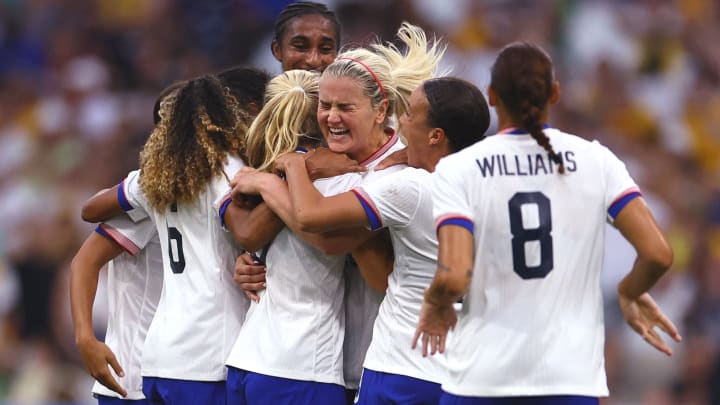USWNT Prioritizes Momentum, Rolls Through Group Stage at Paris Olympics

Check out Sports Illustrated’s Daily Rings, our daily Olympics podcast from Mitch Goldich and Dan Gartland. Subscribe wherever you get your podcasts (Apple, Spotify) and find clips on SI’s YouTube page.
After weathering a wave of dangerous last-ditch efforts from Australia, the U.S. women’s national team left Stade de Marseille on Wednesday with three points and a 2–1 win over the Matildas. The result secures a first-place Group B finish and a three-game sweep for the Americans. The only other time the USWNT logged three wins in three group-stage matches at the Olympics was in 2012 when the U.S. took home gold.
With a quarterfinal matchup against Japan on the horizon, the USWNT heads to Paris for the knockout rounds with plenty of lessons learned and valuable takeaways from a tricky match against Australia.
More goals
Remember when the USWNT had a scoring problem? Any finishing struggles appear to be far in the U.S.’s rearview mirror. Emma Hayes’s side not only logged another multi-goal game, but managed to do so against a very compact and disciplined low block. Australia lined up with five across the back line to start the match, clogging up the final third and leaving little space for the USWNT’s forwards to get in behind. But the imposing trio of Sophia Smith, Trinity Rodman and Mallory Swanson still found its moments, picking out channels as the three worked tirelessly to pull apart Australia’s defense. Finally, the USWNT broke the deadlock in the 43rd minute, as Rodman poked in a bouncing Smith header following a U.S. corner kick.
MADNESS IN FRONT OF GOAL!
— U.S. Women's National Soccer Team (@USWNT) July 31, 2024
🎥 » @NBCOlympics
pic.twitter.com/HMyprOlB2d
The game opened up a bit more in the second half as Australia fought to get level, providing the U.S. with more attacking opportunities. Substitute Korbin Albert made the most of the space, ripping a banger from the top of the box into the upper 90, beyond the hands of Australia’s outstretched keeper. The goal, Albert’s first in the Olympics, doubled the Americans’ lead in the 77th minute.
LET IT RIP, KORBS!!! 🚀🚀🚀
— U.S. Women's National Soccer Team (@USWNT) July 31, 2024
🎥 » @TelemundoSports
pic.twitter.com/cdE3jf533k
Another promising sign for the USWNT: Its goals have come from various scenarios. Hayes and her staff have been adamant about practicing set pieces, and that focus finally paid off against an Australian side that’s been coughing up goals off corner kicks throughout this tournament.
Fresh legs vs. cultivating chemistry
The U.S. emphasized the importance of staying present ahead of its final group match against Australia. “For us, it's really important to just focus on this game and know that we want to put back-to-back-to-back performances together and this is one of those times to do that,” said Smith ahead of Wednesday’s game.
Hayes’s “one-game-at-a-time” philosophy was almost immediately put to the test when, in the third minute, midfielder Sam Coffey was issued a yellow card. Already booked heading into the Australia matchup, Coffey will now be suspended for the USWNT’s quarterfinal against a robust Japan squad. That was a risk Hayes seemingly was willing to take as she prioritized getting her starters more minutes together over rotation.
She only made one change to the starting lineup from the USWNT’s first two Olympic outings, with Emily Sonnett replacing Tierna Davidson, who was sidelined with a leg contusion that she picked up against Germany. The U.S.’s first substitution came at the break before Hayes made a wave of changes in the 65th minute and another in the 79th. One of those swaps was Lynn Williams coming in for Rodman, who, like Coffey, was also sitting on a yellow card entering the Australia matchup.
Managing minutes in a dense Olympic schedule is a delicate balance. With a team humming like the U.S. has been, there’s an argument to be made for letting the momentum roll. There is also a counterpoint about the importance of rest when a knockout spot is already guaranteed and a tough Japan team awaits. The impact of Hayes’s decision won’t be known until Saturday's quarterfinal, when the USWNT must charge ahead without Coffey and, potentially, with heavier legs.
What’s next
Hayes will need to do some roster MacGyvering before Saturday to account for Coffey’s absence. The defensive midfield position is a notoriously tough spot to fill for the USWNT, but Hayes has options. Sonnett, who stepped in for an injured Davidson at center back, is a Swiss-army knife of a player. The 30-year-old can slot in at almost any position and, critically, has experience playing the No. 6 in major tournaments. Should Davidson be available against Japan, Sonnett is a reliable choice to reinforce the midfield. Albert, who showed what she can do in more of an attacking role against Australia, can also play across the midfield and is slowly gaining experience lining up alongside Lindsey Horan.
“You could put anyone out there and know that we all have the same goal,” said Smith. “We all are going to trust each other to get the job done, whatever that looks like. I think that’s the coolest thing about this team, you can put anyone out there. If someone goes down, it’s next one up. We trust everyone. I know the staff trusts everyone. It’s a good feeling to have knowing that we have so many players that can step up when needed.”
Whichever combination of personnel Hayes decides to go with, her players will have their work cut out for them against a revived Japan. Losing narrowly (2–1) to reigning World Cup champion Spain, Japan has shown strength and discipline through the group stage. Hayes, however, will hope her speeding freight train led by Rodman, Smith and Swanson has accumulated enough kinetic energy in its opening three matches to hurtle through its first elimination game of the Olympics.
